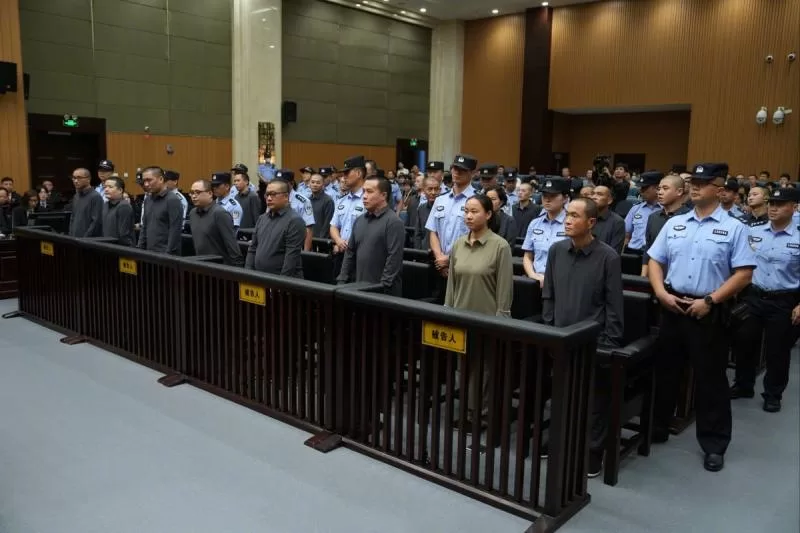
China Executes 16 in Myanmar Crime Crackdown
A major Chinese court ruling has drawn global attention after 16 members of a Myanmar-based crime family were sentenced to death for their roles in large-scale telecoms fraud, drug trafficking, and organized prostitution. The verdict, delivered in Zhejiang Province, highlights Beijing’s escalating campaign to dismantle cross-border syndicates that have long exploited the porous borders of Myanmar’s northeastern Shan State.
Origins of the Ming Crime Family
The syndicate at the center of the case is known as the Ming family gang, a notorious group that consolidated power in Myanmar’s Kokang region. Located along the border with China’s Yunnan Province, Kokang has been a hub for illicit activities for decades. The Ming family used its political and social influence to build a network of “industrial parks” that housed vast scam centers, casinos, and trafficking operations.
Reports from Chinese prosecutors revealed that since 2015 the Ming family’s criminal enterprises generated over 10 billion yuan (45 billion baht) through fraud and exploitation. Victims across China were lured into fake investment schemes, online gambling, phishing scams, and extortion plots that left families financially and emotionally devastated.
Brutality and Violence
While the Ming syndicate is best known for telecoms fraud, its violence against victims and rivals set it apart from many other groups. The gang allegedly executed and tortured those who resisted or tried to flee its compounds.
In October 2023, one of the group’s most shocking crimes was committed when members opened fire on Chinese captives in Kokang. Four people were killed, a brutal attempt to prevent their transfer to Chinese authorities. This act underscored the ruthlessness of the organization and strengthened Beijing’s resolve to bring the family to justice.
High-Profile Defendants
Among the 16 sentenced to death was Ming Guoping, also known locally as Mg Myin Shaut Phyin. He was the son of Ming Xuechang, a Chinese-Myanmar national with deep political connections.
Ming Xuechang had served as a legislator in Shan State and was part of the Kokang leadership committee. He was arrested by Chinese police in late 2023 but died in custody in what authorities described as a suicide.
Ming Zhenzhen, also known as Ma Thiri Maung and the granddaughter of Ming Xuechang, was likewise sentenced to death.
In total, 16 death sentences were issued. Five received a two-year reprieve, which in China often means eventual commutation to life imprisonment. Eleven others were sentenced directly to life imprisonment, ensuring they will not return to criminal activities.
China’s Crackdown on Telecoms Fraud
The sentencing is part of China’s nationwide crackdown on telecoms fraud, a problem that has plagued the country for years. Since July 2023, the Ministry of Public Security has coordinated with Southeast Asian governments—including Myanmar, Thailand, and Cambodia—to target cross-border scam syndicates operating out of the Golden Triangle region.
This rugged border zone, where Myanmar, Laos, and Thailand converge, has long been associated with illicit activities, from narcotics to human trafficking. In recent years, telecoms fraud emerged as its most profitable criminal industry. Scam compounds operated like high-security factories, housing thousands of workers—many of them trafficked or deceived into joining.
By December 2024, Myanmar’s authorities had handed over more than 53,000 suspects to China, marking an unprecedented level of bilateral cooperation. These arrests, combined with high-profile court cases like the Ming trial, have begun to dismantle networks that once seemed untouchable.
The Kokang Connection
Kokang, in northeastern Shan State, has a unique history. Populated largely by ethnic Chinese, the region has long served as a grey zone between China and Myanmar. Criminal organizations flourished there, taking advantage of weak law enforcement and cross-border family ties.
The Ming family exemplified this dynamic. By blending local political influence with transnational criminal operations, the syndicate managed to resist prosecution for years. Only after escalating violence and mounting international pressure did Myanmar begin to cooperate more actively with Beijing.
International Impact
The Ming case carries significance beyond China and Myanmar. Telecoms fraud is not confined to Chinese victims—international law enforcement agencies have linked similar scam compounds in Southeast Asia to victims in the United States, Europe, and beyond.
By striking hard at one of the largest syndicates, Beijing is sending a signal to other groups in the region. Neighboring countries like Thailand and Cambodia have also increased raids on compounds where trafficked workers are forced into scam operations. The coordinated effort reflects a broader recognition that cross-border cybercrime is a global security issue.
Human Cost of Fraud
Behind the headlines and legal victories are thousands of victims who lost their life savings. Fraudulent schemes drained bank accounts, destroyed trust within families, and in some cases led to suicides among the defrauded.
Equally tragic are the stories of trafficked workers. Many young people from Myanmar, Laos, and other countries were lured with promises of legitimate employment, only to find themselves imprisoned in scam centers, forced to work under threat of violence. Testimonies from survivors have described beatings, starvation, and electric shocks for those who failed to meet “fraud quotas.”
Looking Forward
The death sentences handed down in Zhejiang Province mark a milestone in China’s battle against telecoms fraud. Yet experts caution that the fight is far from over. Criminal syndicates are adaptive, and as enforcement tightens in Myanmar, new bases may emerge in other weakly governed areas.
For Myanmar, cooperation with China offers both opportunities and challenges. On one hand, cross-border law enforcement could strengthen security and reduce crime. On the other, critics warn that heavy reliance on Beijing risks undermining Myanmar’s sovereignty and further entrenching Chinese influence in Shan State.
Conclusion
The execution sentences for the Ming crime family represent one of the harshest punishments yet in China’s anti-fraud campaign. It demonstrates the scale of the threat posed by telecoms syndicates rooted in Myanmar and the seriousness with which Beijing intends to address it.
As thousands of suspects face trial and scam centers continue to be dismantled, the world will watch closely to see whether these measures bring lasting relief to victims or merely push criminal enterprises deeper underground.
Credit: Bangkok Post
FAQs for the Article
1. Who are the Ming family crime syndicate?
The Ming family crime syndicate is a Myanmar-based criminal group from Kokang, Shan State. They were involved in telecoms fraud, drug trafficking, gambling, and prostitution, generating billions of yuan in illegal profits.
2. Why did China sentence 16 members to death?
The Zhejiang court found that members of the Ming family committed large-scale telecoms fraud, trafficking, and violent crimes, including killing victims who tried to escape. Sixteen members received death sentences, with some given a two-year reprieve.
3. Where did the Ming family operate?
The syndicate operated mainly in Myanmar’s Kokang region, close to the China border. They used compounds and “industrial parks” to run scam operations targeting thousands of victims.
4. How is China cracking down on telecoms fraud?
China has launched a nationwide campaign since July 2023, working with Myanmar, Cambodia, and Thailand to dismantle cross-border scam centers. By December 2024, Myanmar handed over more than 53,000 suspects to China.
5. What crimes were the Ming syndicate involved in?
Their crimes included telecoms fraud, drug trafficking, organized prostitution, online gambling, extortion, and violent assaults against victims and rivals.
6. What impact has the crackdown had on Myanmar?
Myanmar has cooperated with China by arresting and extraditing suspects. This has disrupted some criminal networks, though critics warn new groups may emerge elsewhere in the Golden Triangle.
7. What is the Golden Triangle’s role in crime?
The Golden Triangle, where Myanmar, Laos, and Thailand meet, is a hotspot for drug trafficking and fraud. It has become a global center for scam compounds exploiting victims from Asia and beyond.
Related posts:
 UN Special Rapporteur Report on Myanmar Rights
UN Special Rapporteur Report on Myanmar Rights
 China Executes 5 from Myanmar Scam Gang in Fraud Crackdown
China Executes 5 from Myanmar Scam Gang in Fraud Crackdown
 Myanmar junta fortifies Sittwe as AA nears Rakhine
Myanmar junta fortifies Sittwe as AA nears Rakhine
 ASEAN to Decide on Myanmar Election Observers in 2025
ASEAN to Decide on Myanmar Election Observers in 2025
 Myanmar Destroys 150 Scam Centers Near China Border
Myanmar Destroys 150 Scam Centers Near China Border
 Myanmar National Unity Government 2025 Faces Calls for Reform
Myanmar National Unity Government 2025 Faces Calls for Reform
